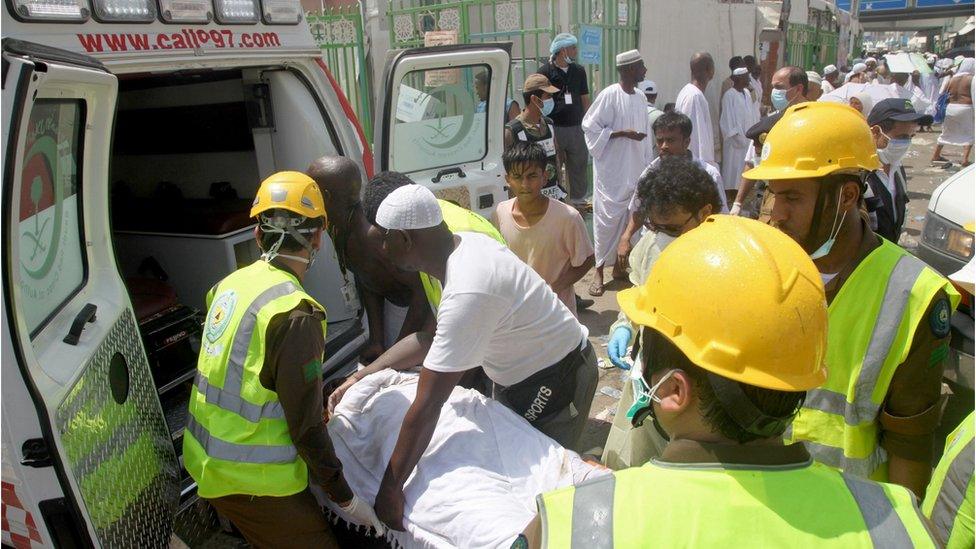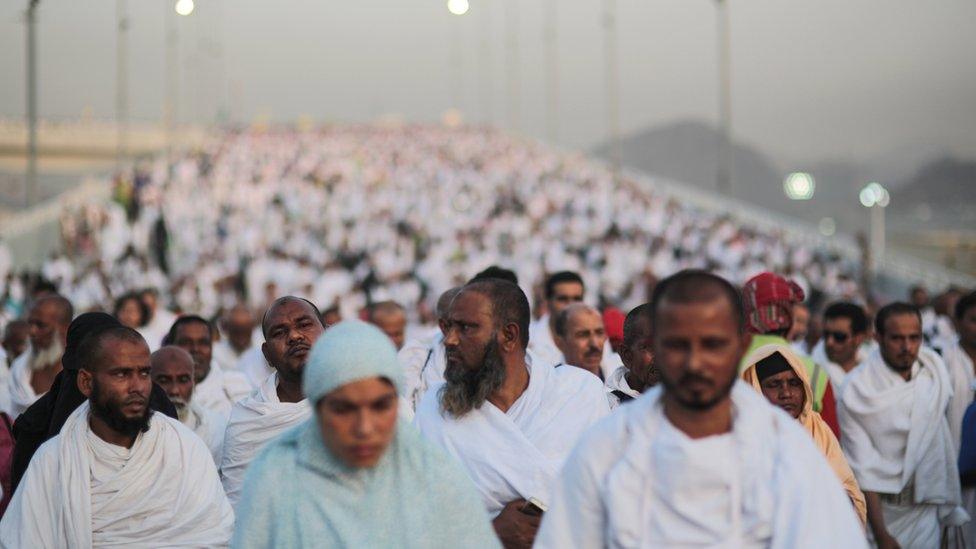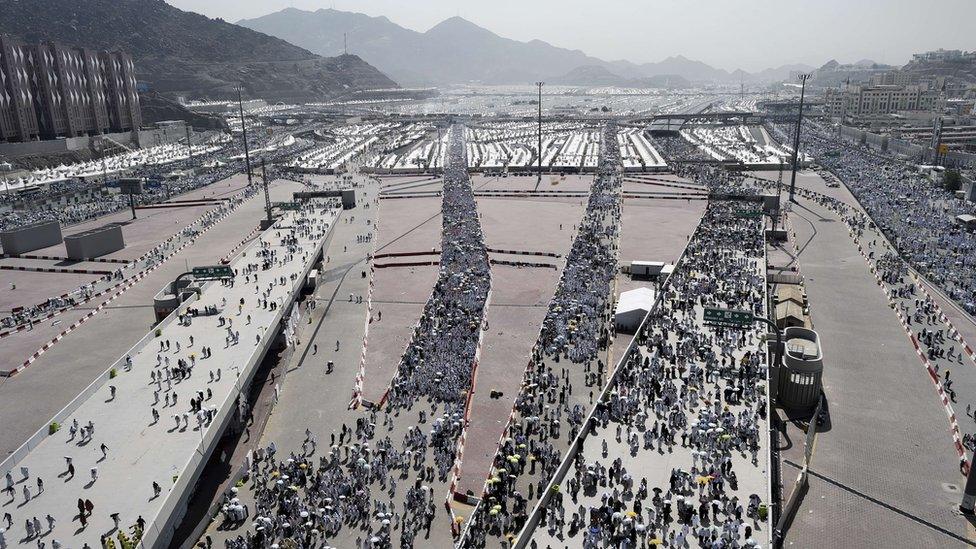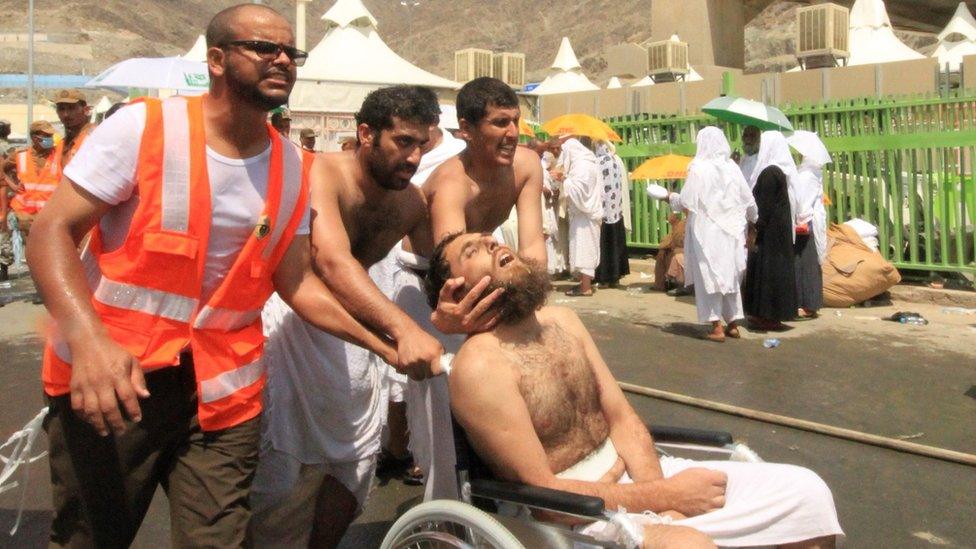Hajj stampede: UK 'ready to help' Britons in Mecca
- Published

UK officials are "urgently" trying to gather information on Britons possibly caught up in the fatal stampede near Mecca, the foreign secretary has said.
At least 717 people taking part in the Hajj pilgrimage were killed and more than 860 injured, local officials said.
About 25,000 British Muslims have travelled to Saudi Arabia. It is not known if any of the dead are British.
Meanwhile, British Muslim families are hoping for contact with relatives who had been making the pilgrimage.
Prime Minister David Cameron said his "thoughts and prayers" were with the victims' families, while Foreign Secretary Philip Hammond said he was "saddened".
"Our staff remain in close contact with the Saudi authorities and tour operators, and are checking hospitals and other locations to urgently gather information about British nationals who may require assistance," said Mr Hammond.
The UK Foreign Office said the British embassy in Riyadh and British consulate-general in Jeddah were also urgently seeking more information and were ready to offer support to any British nationals involved.
The Foreign Office said those worried about friends and family could call 020 7008 1500.
'Locate pilgrims'
The incident happened in Mina, about 5km (3 miles) from the Islamic holy city of Mecca, as two million pilgrims took part in the Hajj's last major rite.
There they throw seven stones at pillars called Jamarat, which represent the devil. The pillars stand at three spots where Satan is believed to have tempted the Prophet Abraham.
Rashid Mogradia, from the Council of British Hajjis, an organisation which looks after the welfare of British pilgrims going to Mecca, said: "On the one hand we have Muslims around the world and here in the UK celebrating Eid and on the other hand we have this tragic incident unfolding before us.
"We've been in contact with a number of tour operators who have taken around 20,000 British pilgrims out for the Hajj... and [we are]advising them on the next step in trying to locate their pilgrims to account for them.
"We are seeing on a hourly basis and now minute-by-minute the numbers [of dead] are increasing and we hope that's the end of what we hear."
Qasim Ahmed, from Glasgow, said he was still waiting to hear from his father who is in Mecca.
"I am beside myself with worry," he said.
"Something doesn't feel right. He hasn't been in touch all day and today is Eid."

About 25,000 British Muslims are among those performing the Hajj this year
Kashif Latif, from Birmingham, is taking part in the Hajj pilgrimage and said he was not aware of the stampede until relatives contacted him.
He told the BBC: "The Hajj itself, you feel a high level of euphoria, you're doing a pilgrimage that's required of you once in a lifetime, and then to hear of the deaths and numbers that are escalating exponentially, it's a very sombre mood, a very, very sombre mood."
Humza Yousaf, the Scottish National Party minister for Europe, said his parents were in Mecca, and he tweeted, external: "Big sigh of relief to hear they're safe. Heart goes to those who haven't heard news and to those affected."
He told the BBC there should be an investigation into how it happened.
The pilgrims were walking towards the five-storey structure which surrounds the pillars, known as the Jamarat Bridge.
The incident happened when there was a "sudden increase" in the number of pilgrims heading towards the pillars, according to Saudi officials.
The stampede is the worst incident at the Hajj in 25 years.

Pilgrims travel to Mina during the Hajj to throw seven stones at pillars called Jamarat
Sir Iqbal Sacranie, secretary general of the Muslim Council of Britain until 2006, said efforts were made to keep order but it was difficult with such huge numbers of people attending from around the world.
Each year the numbers going to Hajj were increasing by about 8%, he said.
The Saudi authorities have spent billions of dollars on improving transport and other infrastructure in the area in an attempt to try to prevent such incidents.
- Published24 September 2015
